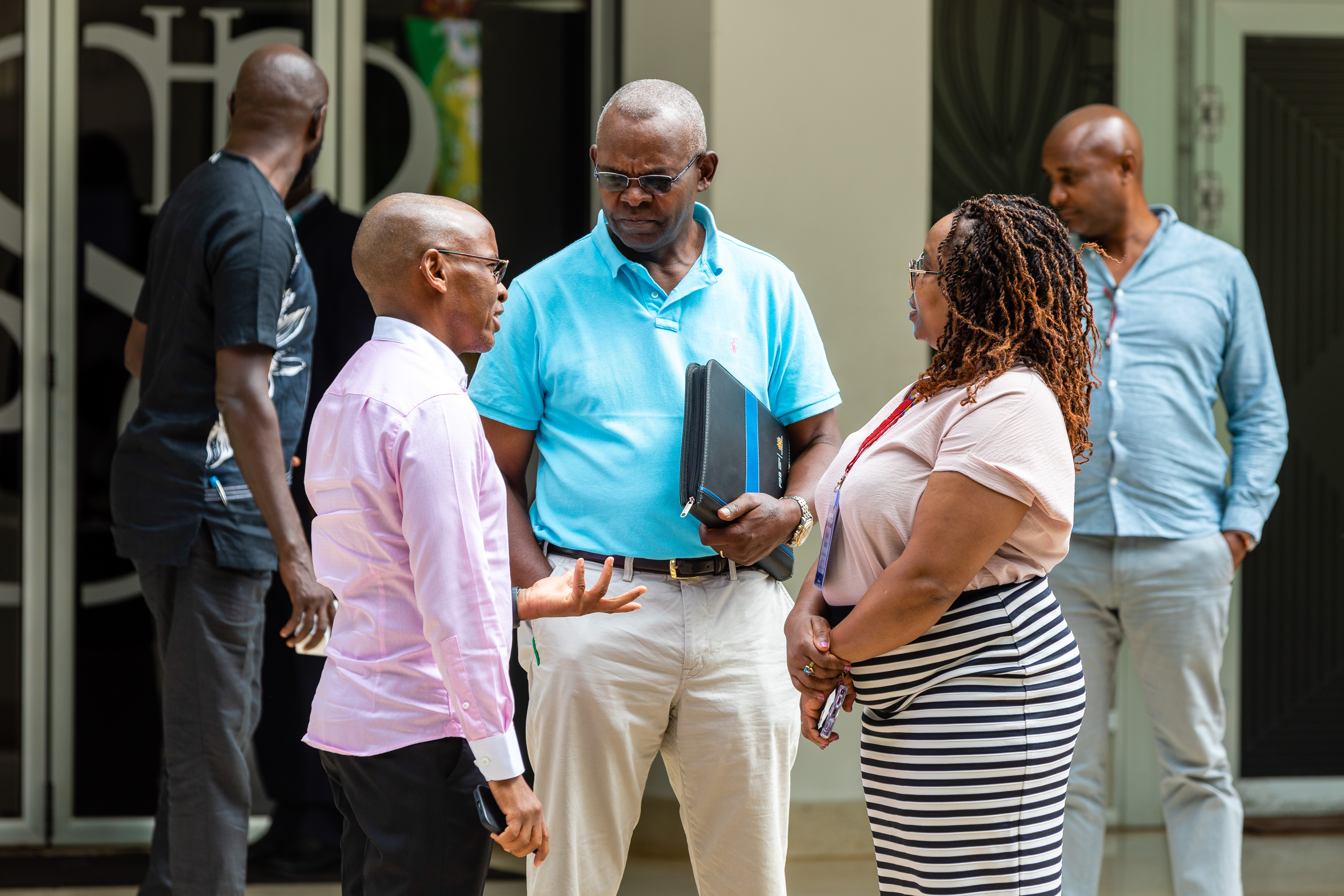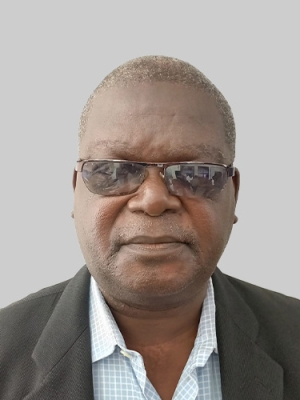
Ommy Dallah
Lending to individuals and small businesses to increase as Kenya overcomes difficult 2024
Diamond Trust Bank (DTB) has forecast an increase in lending to individuals and small businesses as Kenya’s economy stabilises and growth becomes steady after the difficult times encountered last year.
DTB Kenya Chief Executive Officer Murali Natarajan said the banking sector’s credit are also likely to double in the next decade from the current $32 billion if the current momentum is maintained.
Speaking at the DTB Economic and Sustainability Forum in Nairobi, Mr Natarajan said the immediate impact will be felt by individuals and small businesses.
“When I look at the resilience of the economy and the track record of having dealt with so many challenges, that gives me immense confidence that I feel very confident about going forward,” said Mr Natarajan.
“When I look at the MSME segment, which is partly informal and partly formal, going forward and as banks start focusing on retail and SMEs, I feel that there is a big opportunity there. Working with our team, with the guidance of the board and the Group CEO, we are pretty confident that focusing on the segments, like agriculture, retail, MSME and making it more small ticket and mass, we should be able to double our balance sheet in about three to four years,” Mr Natarajan added.
He said this would entail more focus on the Bank’s digital offerings, partnerships and increasing the number of branches to reach more customers.
Mr Natarajan said his forecast is supported by the stability of the Kenyan economy following interventions to reduce interest rates and the effect of plentiful rains and the reduction of fuel prices.
“I congratulate the Government and the Central Bank of Kenya for steering the ship through difficult times last year. The macros look stable, interest rates are coming down, and the flow of remittances from Kenyans abroad continue,” said Mr Natarajan.
DTB projects economic growth at 5 per cent this year, but with challenges and risks to remain.
Dr Chris Kiptoo, the Principal Secretary for the National Treasury, said he is optimistic that the current momentum will continue.
“When I started, it was very hard, and I had many sleepless nights. Now the worst is over, but the future is brighter. We have a resilient economy, diversified, and that’s how we come out of shocks,” said Dr Kiptoo.
Dr Kiptoo said the focus for the Budget in the next financial year would be on agriculture, exports of tea, edible oil, cotton, leather, dairy, natural resources, building materials, and the blue economy.
To boost lending to the private sector, said Dr Kiptoo, the Credit Guarantee Scheme would be transferred to a government-owned company to keep it going. The Credit Guarantee is currently an arrangement between the government and seven banks where the Government commits to pay a portion of the outstanding amount in the case of a default.
Dr Kiptoo said the committee verifying pending bills has so far approved the payout of KSh236 billion of the more than KSh600 billion when the Kenya Kwanza administration took over. Of this, he said, the bulk would go to small businesses that are suppliers and to road contractors.
The Principal Secretary said Kenya would continue to be in the International Monetary Fund programme to maintain stability.
The implementation of the Single Treasury Account, e-procurement policy, zero-based budgeting, and the working with Public-Private Partnerships would be prioritised as the Government looks to increase spending on development.
IGAD, AUDA-NEPAD Launch Special Programme to Revitalize Sexual Reproductive Health Services and Enhance Health Care Financing in the IGAD Region
The Intergovernmental Authority on Development (IGAD) in partnership with the African Union Development Agency AUDA-NEPAD have launched the Africa Demographic Dividend and Sexual and Reproductive Health (A2DSRH) Programme at an ongoing Regional Meeting in Addis Ababa.
The newly signed 5-year A2DSRH Programme was officially launched by Dr. Mariamawit Asfaw, the Head Executive Officer of the Maternal, Child and Adolescent Health Services at the Ministry of Health of the Federal Democratic Republic of Ethiopia together with Mr. Abebaw Bihonegn, the IGAD Head of Mission to Ethiopia and Mr. Godefay Hagos Debeb from AUDA-NEPAD as witnessed by high level Sexual Reproductive health experts from the IGAD Member States and IGAD Secretariat.
The A2DSRH Programme also aims at strengthening regional and domestic resource mobilization and health financing for sustainability through improved public private partnerships within the IGAD region with the goal of establishing an IGAD Regional Health Financing Hub.
Dr. Mariamawit Asfaw highlighted that Africa is a continent blessed with a youthful population, accounting for over 60% of the people under the age of 25, presenting a unique opportunity for transformative growth and development and she stressed that to fully realize this potential, there is need to prioritize investments in SRH with policies and initiatives focusing on supporting the youth particularly for adolescents and youth.
“Access to comprehensive SRH services, including family planning, maternal health, and HIV prevention, is essential for empowering our young people and ensuring their well-being. By investing in SRH, we can reduce maternal and infant mortality, improve educational outcomes, and promote gender equality. These efforts will not only benefit individuals but also drive economic growth and social progress across the continent” Dr. Asfaw emphasized.
On behalf of IGAD, Mr. Abebaw Bihonegn, the IGAD Head of Mission to the Federal Democratic Republic of Ethiopia delivered his remarks on behalf of the Executive Secretary Dr. Workneh Gebeyehu extending his appreciation to AUDA-NEPAD for partnering with IGAD to focus on strengthen Member State Sexual Health systems to efficiently and effectively deliver Sexual Reproductive Health services across IGAD Member States Hub and advised that for successful operationalization of the joint regional initiative requires strengthened regional health coordination mechanisms.
“The greatest risk factors for adolescent health within the IGAD region are linked to sexual and reproductive health thus leaving the young people and other focus groups being faced with significant challenges related to sexual and reproductive health such high maternal mortality due to inadequate healthcare infrastructure; high and unmet need for family planning services; limited access to comprehensive sexual and reproductive healthcare; high dependence on donor funding of health systems and health service delivery have continually hindered the delivery of sexual and reproductive health services” Mr. Bihonegn added.
Additionally, Mr. Godefay Hagos Debeb, the Senior Advisor to the CEO on A2DSRH of the AUDA-NEPAD, called on the IGAD Member States to deliberately prioritize SRH interventions, we can drastically reduce these challenges and improve overall health outcomes. This includes fostering a healthier, more productive workforce capable of driving long-term economic participation and growth toward the “Africa We Want.”
“In this Programme, we are working with 11 Member States and 5 RECs focusing on interventions of policy advancement, high-level advocacy (at national, regional, and continental levels), strengthening governance and coordination platforms through multi-sectoral collaboration, enhancing support to RECs to realize their Regional Health Organizations, increasing healthcare financing through sustainable financing mechanisms, and providing technical and institutional capacity building—particularly in research and innovation” Dr. Debeb added.
For the IGAD Chair, Mrs. Fatouma Ali Abdallah, Director of Maternal and Neo-natal Department re-echoed that by promoting SRH is a fundamental pillar of human capital development, and we must see it as a cornerstone of health systems strengthening to reduce maternal mortality and advance the Universal Health Coverage agenda.
The meeting brings together Sexual and Reproductive Health Directorates, Reproductive Health Experts from IGAD Member States and other health experts from IGAD and AUDA-NEPAD with the objective of revitalizing Sexual Reproductive Health (SRH) coordination bodies, knowledge exchange and experience sharing and conducting feasibility assessment in view of establishing an IGAD Regional Health Organisation serving to support IGAD Member States through different mechanisms to respond and address key national/regional challenges and priorities related to Sexual Reproductive Health thus enhancing their capacity to build, strengthen, scale up their national health systems and networks in the provision of sexual reproductive health services to align with Goal 3 of the 2030 SDG targets of ensuring healthy lives and promote well-being for all at all ages in the region.
Kenya Records 15% Increase In International Tourists Arrivals
Kenya's tourism sector welcomed a record 2.4 M international arrivals in 2024, surpassing Kenya’s highest arrival numbers.
In the 2024 performance report released today by Cabinet Secretary for Tourism and Wildlife, Rebecca Miano, the inbound arrivals figures represented a significant 15 %increase from the 2,089,259 recorded in 2023.
Similarly, there was a substantial increase in inbound tourism earnings, rising from Kshs. 377.49 billion in 2023 to Kshs. 452.20 billion in 2024, reflecting a 19.79% increase.
The domestic tourism sector also recorded impressive gains, with bed night occupancy rose by 16% from 8,632,803 in 2023 to 9,992,721 in 2024. The report also states that occupancy by international visitors increased from 4,014,707 in 2023 to 4,818,755 in 2024, indicating a growth of 20%.
Speaking during the launch of the report in Mombasa, CS Miano said the figures validate the government's strategic interventions to revitalize and diversify the tourism sector.
“This progressive achievement is as the result of concerted strategic intervention that include aggressive marketing campaigns, enhanced tourism product diversification, adoption of digital platforms, and the introduction of new scheduled flights," remarked the CS, highlighting the reasons for the remarkable travel influx.
"A key enabler has been product diversification and digital transformation advancements. These gains underscore the effectiveness of strategic interventions such as enhanced air connectivity,” she added.
The United States maintained its position as Kenya's top source market, accounting for 12.8% of total arrivals, with 306,501 visitors. Tanzania and Uganda followed suit, contributing 8.4% and 9.4% respectively, reflecting the robust intra-regional travel within the East African Community (EAC).
Notably, the East African Region (EAC) showcased impressive growth, with Tanzania recording the highest increase of 42,133 arrivals, followed by China with a remarkable 29,085 additional visitors.
The United States, Somalia, Italy, and Uganda also experienced significant increments, underscoring the global appeal of Kenya's diverse tourism offerings.
On the continental front, Africa emerged as the leading source market, contributing 40.8% of arrivals, with 975,883 visitors. Europe followed closely at 28.1%, while the Americas and Asia accounted for 15.7% and 12.1% respectively.
"The remarkable performance of the African source market has been phenomenal and continues to take center stage of a very dynamic shift, which is crucial in fostering intra-regional integration and economic growth," remarked CS Miano, underscoring the pivotal role of intra-Africa travel in driving sustainable tourism development.
While highlighting some of the strides made in Kenya's diversified tourism portfolio, the CS spotlighted growth recorded in key segments including cruise tourism, which saw a remarkable 163.5% increase, with 6,561 tourists in 2024, up from 2,490 in 2023.
Likewise, the Meetings, Incentives, Conferences and Exhibitions (MICE) category accounted for a significant 27% (643,595) of the total international tourism arrivals during the period under review, representing a 12.5% increase compared to 2023 when it accounted for 24% (599,114) of the total inbound tourist arrivals.
Miano expressed optimism for the tourism sector's continued growth and transformation in 2025.
Preliminary UN Tourism projections point to improved global performance this year with international tourist arrivals forecasted to increase by 3% to 5% compared to 2024.
"Based on current trends and our growth strategy, we remain optimistic that Kenya is on course to welcome 3 million visitors by 2025, potentially generating Ksh560 billion in tourism earnings. We have laid a firm foundation to make Kenya a competitive global tourism destination.”
The CS pledged to foster more public-private partnerships as well as implement policies and initiatives that will contribute to the sustainable growth of the sector and its competitiveness in the dynamic global tourism landscape.
NBA Africa And Safaricom's Mpesa Launch League's Most Expansive Youth Developement Program In East Africa
NBA Africa and Safaricom (NSE: SCOM), the region’s leading technology company, launched the M-PESA Jr. NBA program, which will provide basketball development and financial literacy programming to more than 10,000 boys and girls in Nairobi, Mombasa, Eldoret, and Kisumu, marking the league’s most expansive youth development program in East Africa to date.
The first year of the M-PESA Jr. NBA program, which tipped off with a clinic for more than 100 local coaches at SABIS International School in Nairobi on Feb. 15, will consist of four regional tournaments for youth ages 13-16 in Nairobi (Feb. 22-23), Mombasa (March 8-9), Eldoret (March 15-16) and Kisumu (March 22-23).
In each city, 20 boys’ and 20 girls’ teams will participate in skills development sessions and competitive games.
The top 80 players will then be grouped into four boys’ teams and four girls’ teams that will play games in a round-robin format. The top 16 boys and girls from each city will be selected to attend an elite top 100 camp at Aga Khan Academy in Mombasa in April.
In addition to the basketball development programming, M-PESA, Safaricom’s innovative mobile payment platform, will host financial literacy workshops for the participating youth, empowering them to develop healthy financial habits.
“Tipping off our multiyear collaboration with Safaricom is an important milestone in our ongoing efforts to make basketball more accessible to Kenyan boys and girls,” said NBA Africa CEO Clare Akamanzi. “We look forward to positively impacting youth and coaches across the country through basketball development and life-skills programming.”
“Our collaboration with NBA Africa could not have come at a more opportune moment, as Safaricom’s M-PESA will celebrate its 18th anniversary this March, marking a significant milestone in our journey,” said Safaricom CEO Dr. Peter Ndegwa. “Through M-PESA Go, this partnership transcends beyond basketball. It is driven by a shared vision to create a lasting impact, not only in sports but also in the broader context of youth empowerment."
"We are committed to nurturing potential, building character, and equipping the next generation with the tools necessary for success. We firmly believe that the collaboration between M-PESA Go and the Jr. NBA program can pave the way for growth and financial health, enabling young athletes to develop their skills and seize opportunities at the next level.”
Kasiva Mutua Releases Highly Anticipated Debut Album 'Desturi'
East Africa’s leading female percussionist, Kasiva Mutua has released her debut album ‘Desturi’ (tradition).
The 11-track album is a celebration of African heritage and resilience, exploring themes like African identity, the power of love, women rights and spirituality.
Each song pulses with the essence of Africa—a celebration of what makes the continent and its people unique, even as we adapt and evolve in a changing world.
Kasiva who is stepping into an extraordinary new chapter shared what her debut album symbolizes.
“Desturi is like a birthing ceremony for me, where I finally share my heart’s deepest conversations, all while honoring the rhythm that has always guided me. Desturi is where my silent conversations, curiosity, and the unspoken thoughts come alive. It’s a pathway of looking at our traditions and hence our identities; choosing what serves us, and giving ourselves permission to simply - become.”
“Twende Mbele” is a heartfelt instrument-laden track is an anthem of empowerment and unity celebrating African culture, leadership, cohesion and resilience.
Amidst the recent unrest witnessed in major parts of Africa, this song serves as an uplifting and motivational anthem, encouraging people to move forward with determination.
Kasiva says, “I wrote this song as a call for Africans of all backgrounds to keep moving forward—socially, economically, culturally and environmentally. Every step forward contributes to progress, leading to victory, economic liberation, peace, stability and prosperity.”
Through its compelling rhythms and evocative melodies, ‘Desturi’ redefines what African music can be—rooted in heritage yet daringly progressive.
It’s a testament to the continent’s enduring creativity and cultural heartbeat.
“Ndikweteela” draws from the rhythmic influences of Maloya music from La Réunion, coastal Kenya’s Chakacha traditions and Isukuti beats from Western Kenya–showcasing a captivating fusion of cultural heritage and modern innovation.
The album’s songs reflect the lives and experiences of Africans, exploring themes of loss, love, celebration and traditional ceremonies.
"Aoko” is a heartfelt tribute to a life never lived but deeply cherished.
Through tender lyrics and gentle melodies, inspired by a close friend's painful experience, captures loss, forgiveness and the enduring bond between souls.
It offers a space for reflection and healing while honoring a baby girl who appeared in a dream with a message of comfort.
From the intricate call-and-response traditions of East African music to the layered rhythms of West African drumming, ‘Desturi’ is a sonic tapestry of the continent’s vast rhythms and sounds.
Finger-picked guitar melodies echo the storytelling of the past, while clap-laden rhythms and modern production breathe life into an album that feels timeless and forward-looking.
Kasiva Mutua’s angelic voice, paired with her rhythmic genius and a newfound mastery of melody, marks this album as a breakthrough project.
Is AI A Game-changer For Cyberthreats In Africa?
As the African continent continues its digital transformation, cybercriminals are becoming increasingly sophisticated, with AI emerging as a tool for more strategic and effective attacks - including distributed denial-of-service (DDoS) strikes.
Bryan Hamman, regional director for Africa at NETSCOUT, explains: “We're witnessing AI not just as a defence mechanism but also as a potential threat amplifier. The adoption of machine learning allows adversaries to automate reconnaissance and tailor attacks at extraordinary scale.”
In many African countries, digital adoption is outpacing cybersecurity measures, placing businesses, governments and individuals in a precarious position.
According to Hamman, without the right proactive measures in place, local organisations risk falling victim to AI-powered threat scenarios, where malware can evade traditional defences, phishing attacks become hyper-personalised and response times shrink dangerously.
"AI can be a double-edged sword, and African businesses must ensure they leverage its benefits for better protection, while steering clear of the darker side of AI by staying a step ahead of attackers," he advises.
Generative AI (GenAI) can take many facets of cyberthreats to new levels. These could include:
- Enhancements to social engineering, such as:
- Crafting more convincing and unique phishing emails.
- Mimicking voices in audio messages.
- Image or video generation:
- Deepfake images have been shown to trick biometric facial recognition if executed correctly.
- Attack scale:
- Scaling an attack to be bigger and better is easier than ever due to the automation AI can empower.
- Automating rudimentary processes, such as sending phishing emails, can allow cyber criminals target more individuals within an organisation to increase their chances of gaining access.
Furthermore, the integration of AI into denial-of-service (DDoS) attacks is becoming a reality, allowing threat actors to optimise botnet behaviour and target selection, making these disruptions more destructive and difficult to mitigate.
NETSCOUT urges organisations to stay vigilant by investing in AI-driven security solutions and fostering a culture of cybersecurity awareness through consistent training.
"The key lies in not just reacting to threats, but pre-empting them," Hamman concludes. “As African markets grow, robust, AI-driven cybersecurity strategies will become increasingly crucial to ensuring that digital innovation is secure and sustainable.”
Mwinyi Jahazi Appointed Chairman Of Seafarers Wages Council
Mwinyi Jahazi has been appointed as the chairman of the Seafarers wages council.
In a gazette notice dated 14th February 2025 and signed by Labour Cabinet Secretary Alfred Mutua, Jazahi will serve for a period of four years.
Captain Peter Munga and Julius Segera have been appointed as members of the council.
"We now have a new council to help our seafarers. We hope to opertaionalise it soon" Jahazi told this blog.
The Seafarers’ wages council aims to enhance terms and working conditions for Kenyan seafarers.
The council was inaugurated on September last year, 2024.
In a statement, Shipping and Maritime Principal Secretary Geoffrey Kaituko noted. "The Seafarers Wages Council(SFWC) is now fully constituted with the appointment of the veteran seafarer, Mwinyi Mohammed Jahazi(the Chairperson), Capt Peter Munga and Julius Segera as Members , representing institutions within the maritime sector."
Adding "Without the immense support we received from key industry players, notably the shipowners/shipping agents, the seafarers themselves, under the leadership of Atie Swaleh Ramadhan(SG Seafarers Union of Kenya) and the management of Kenya Maritime Authority (the Regulator) , the creation of SFWC would have remained a pipe dream."
IGAD Assumes Chairmanship of the Inter-REC Coordination Platform
The Intergovernmental Authority on Development (IGAD) has officially assumed the chairmanship of the Inter-Regional Economic Communities (RECs) Coordination Platform, marking a significant milestone in Africa’s regional integration and cooperation efforts.
Dr. Workneh Gebeyehu, IGAD Executive Secretary, took over the chairmanship from H.E. Dr. Omar Alieu Touray, President of the ECOWAS Commission, for the 2024-2025 period.
IGAD expresses its deep appreciation for Dr. Touray’s leadership and commitment during his tenure, which strengthened coordination and engagement among RECs.
IGAD’s Priorities as Chair As the new chair of the platform, IGAD is committed to driving a collaborative and forward-looking agenda that reinforces regional integration and Africa’s global positioning.
The key priorities include: • Leveraging Digital Innovation & Artificial Intelligence: Advances in artificial intelligence (AI) and digital technology present both challenges and opportunities for Africa. IGAD will work with fellow RECs to harness these innovations for the continent’s development, ensuring that technology is a driver of economic growth and resilience.
- Enhancing Collaboration with the African Union (AU): IGAD will actively engage with the incoming African Union Commission, ensuring that RECs continue to play a strategic role in AU decision-making. The platform will serve as a mechanism to strengthen Africa’s institutional architecture and collective decision-making processes.
- Fostering Unity & Regional Coordination: IGAD upholds an open-door policy and invites all RECs and Regional Mechanisms to engage in a spirit of openness, dialogue, and shared ambition. Strengthening collaboration among regional bodies will be key to addressing Africa’s common challenges and maximizing opportunities.
- Promoting Pan-Africanism & Continental Integration: IGAD remains fully committed to the principles of Pan-Africanism, reinforcing regional unity and advocating for a more integrated, peaceful, and prosperous Africa that speaks with one voice on the global stage.
In assuming this leadership role, IGAD reaffirms its commitment to diligence, cooperation, and advancing Africa’s shared development agenda. Together, Africa’s RECs and AU institutions will work to shape a more resilient and globally competitive continent.
Nairobi Mega Mall Treats Shoppers to Valentine
The Nairobi Mega Mall treated its shoppers to chocolate bars and flowers as a gesture of appreciation during this year’s Valentine’s Day.
The day is marked on February 14 every year to celebrate love. Loved ones use this occasion to exchange flowers, candy and gifts.
The Nairobi Mega Mall, located on Uhuru Highway opposite the Nyayo Stadium, opened its doors in 2020 and is operated by Car & General. With Carrefour as its anchor tenant, the mall houses Safaricom, Airtel, LC Waikiki, City Walk. Bata among other top brands. Nairobi Mega Mall has a good mix of shops ‘on the way’ coupled with ample parking.
“Nairobi Mega Mall offers convenient shopping experience. A part from its diverse tenant mix, the mall also has free parking and a secure basement parking,” said Carol Omanjo, Chief Operating Officer.
Safaricom Hosts its 3rd Annual Investor Day Forum
Safaricom PLC is hosting its 3rd annual investors day forum to update stakeholders on the company’s journey to become Africa’s leading purpose-led technology company by 2030.
The investor day themed "Becoming Africa’s Leading Purpose-Led Technology Company by 2030", has brought together regulatory bodies, analysts and over 200 investors from eight (8) countries – globally.
The two-day forum seeks to provide an opportunity for investors to learn more about the company’s vision and growth prospects. Safaricom's investor day forum is part of the company's efforts to engage with its business partners and stakeholders about its operations, strategies, and impact.
















